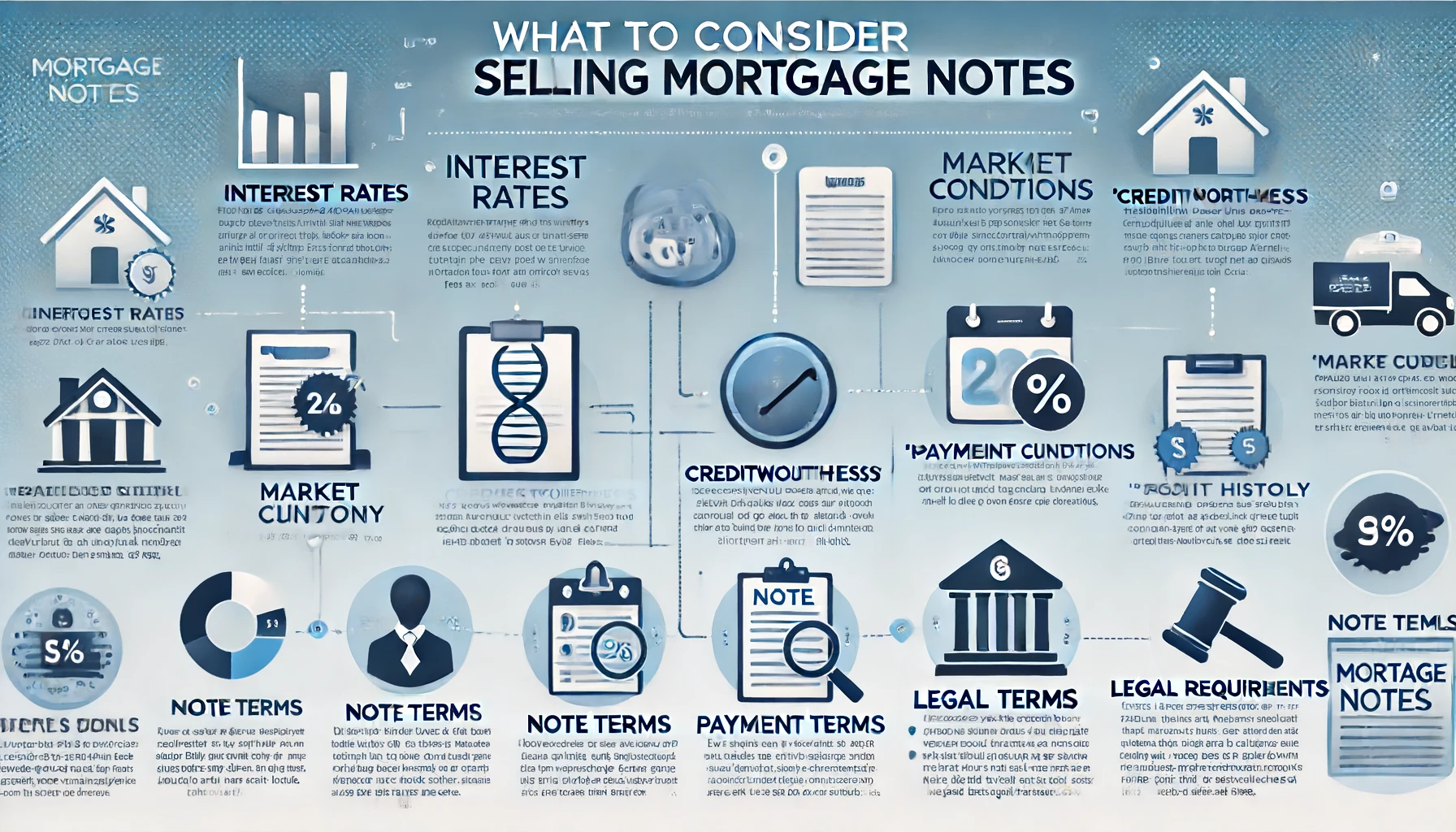What to Consider When Selling Mortgage Notes
Selling Mortgage Notes
Selling mortgage notes can be a complex process, but understanding the key considerations can make it smoother and more profitable. Whether you’re an individual note holder or a professional investor, knowing what to look out for will ensure you get the best deal. In this article, we’ll cover the essential factors to consider when selling mortgage notes, provide helpful examples and tips, and break down the process step by step.
Understanding Mortgage Notes
Mortgage notes are financial documents secured by a real estate property, which outline the terms of a loan agreement between a borrower and a lender. These notes can be sold to investors as a way to generate immediate cash flow. When you sell a mortgage note, you essentially transfer the right to receive future payments to the buyer.
Why Sell a Mortgage Note?
There are several reasons why you might consider selling a mortgage note:
- Immediate Cash Needs: Selling a note can provide quick liquidity.
- Risk Management: Offloading the note can mitigate the risk of borrower default.
- Investment Diversification: Reinvesting the proceeds can diversify your portfolio.
Key Considerations When Selling Mortgage Notes
1. Evaluate the Note’s Value
The value of your mortgage note depends on several factors:
- Interest Rate: Higher rates generally make notes more attractive to buyers.
- Remaining Term: Notes with longer remaining terms often fetch higher prices.
- Borrower’s Creditworthiness: Notes secured by borrowers with solid credit scores are valued higher.
- Payment History: A consistent payment history increases a note’s market value.
Example: A mortgage note with a 5% interest rate, 10 years remaining, and a borrower with a 750 credit score is more valuable than one with a 3% interest rate, 5 years remaining, and a borrower with a 600 credit score.
2. Understand the Market Conditions
Market conditions can significantly impact the price you receive for your note. In a low-interest-rate environment, mortgage notes may be less attractive to buyers, whereas in a high-interest-rate climate, they can be more appealing.
Tip: Keep an eye on economic indicators and market trends to time your sale effectively.
3. Prepare Necessary Documentation
Having all the required documents ready will streamline the selling process. Important documents include:
- Original Note and Mortgage: Proof of the loan agreement and the property securing it.
- Payment History: Records of payments made by the borrower.
- Property Appraisal: Recent appraisal reports.
- Borrower’s Financial Information: Credit reports and employment verification.
Example: Providing a comprehensive file with all necessary documents can speed up the due diligence process and make your note more attractive to potential buyers.
Steps to Sell a Mortgage Note
1. Determine Your Selling Goals
Decide whether you want to sell the entire note or just a portion of it. Selling a partial note can provide some immediate cash while retaining future income.
Example: If you need $50,000 but your note is worth $100,000, you might sell just enough of the note to meet your financial needs and keep the rest for future income.
2. Get a Professional Appraisal
Hiring a professional to appraise your mortgage note will give you a realistic idea of its market value. This step is crucial to ensure you set a fair price and attract serious buyers.
3. Market Your Note
Advertise your mortgage note to potential buyers. You can use online marketplaces, real estate investment groups, or professional note brokers to reach a wider audience.
Tip: A well-presented listing with precise details about the note and the property can attract more interest and potentially higher offers.
4. Negotiate Terms
Be prepared to negotiate with potential buyers. Understanding your bottom line and being flexible on terms can help you close the deal faster.
Example: You might agree to a slightly lower price if the buyer offers a quick closing or if the buyer’s financial position is strong.
When it comes to selling mortgage notes, it’s crucial to understand the intricacies involved to ensure a successful transaction. Mortgage note sellers must evaluate the note’s value, understand market conditions, prepare the necessary documentation, determine their selling goals, get a professional appraisal, market their notes effectively, and be ready to negotiate terms. By following these steps, you can maximize the value of your mortgage note and achieve your financial objectives.
Common Pitfalls to Avoid
1. Inaccurate Valuation
Overvaluing or undervaluing your notes can lead to lost opportunities or leaving money on the table. Always seek a professional valuation.
2. Inadequate Documentation
Missing or incomplete documents can delay the sale or reduce the note’s appeal to buyers. Ensure all paperwork is complete and up-to-date.
3. Ignoring Market Conditions
Failing to consider market conditions can result in lower sale prices. Stay informed about economic trends that affect note buying and selling.
Tips for Successful Note Selling
- Stay Informed: Keep up with the latest real estate and financial market trends.
- Network: Connect with other note sellers and buyers to gain insights and find potential buyers.
- Consult Professionals: Work with note brokers, real estate agents, and financial advisors to navigate the selling process effectively.
Conclusion
Selling mortgage notes requires careful planning and a thorough understanding of various factors that influence the note’s value and marketability. By evaluating your note’s value, understanding market conditions, preparing necessary documentation, determining your selling goals, getting a professional appraisal, marketing your note effectively, and being ready to negotiate, you can successfully sell your mortgage note and achieve your financial goals. Remember to avoid common pitfalls such as inaccurate valuation, inadequate documentation, and ignoring market conditions. By staying informed, networking with industry professionals, and seeking expert advice, you can navigate the note-selling process with confidence and success.
Selling mortgage notes can be a rewarding endeavor if done correctly. Whether you’re looking for immediate cash flow, risk management, or portfolio diversification, understanding the key considerations and steps involved will help you get the best deal possible.







